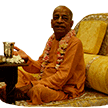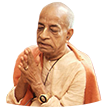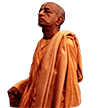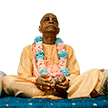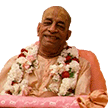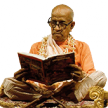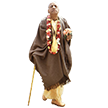Isvaku - a glorious personality: Difference between revisions
(Created page with "Category:Glorious Personalities Category:Glorious Personalities from Bhagavad Gita Category:Glorious Personalities from Srimad Bhagavatam Category:Glorious Perso...") |
No edit summary |
||
| Line 10: | Line 10: | ||
{{Personalitiesnav}} | {{Personalitiesnav}} | ||
<!----------------- BEGIN STANDARD HEADING -----------------> | <!----------------- BEGIN STANDARD HEADING -----------------> | ||
Srila Prabhupada's books, lectures, conversations and letters reveal the qualities of this glorious personality as seen in the Vaniquotes '''[[Vaniquotes:Category: | Srila Prabhupada's books, lectures, conversations and letters reveal the qualities of this glorious personality as seen in the Vaniquotes '''[[Vaniquotes:Category:Iksvaku|Iksvaku]]''' category. An introduction from his books is given below in the following 8 quotes. | ||
<!----------------- END STANDARD HEADING -----------------> | <!----------------- END STANDARD HEADING -----------------> | ||
---- | ---- | ||
== Quotes from Srila Prabhupada's | == Quotes from Srila Prabhupada's books == | ||
<!----------------- edit quote boxes below this line -----------------> | <!----------------- edit quote boxes below this line -----------------> | ||
{{VaniQuotebox| | {{VaniQuotebox|From Bhagavad-gita we get information that Vaivasvata Manu was the son of the sun-god and that his son, Maharaja Iksvaku, ruled this planet earth|From Bhagavad-gītā we get information that Vaivasvata Manu was the son of the sun-god and that his son, Mahārāja Ikṣvāku, ruled this planet earth. Svāyambhuva Manu, however, appears to have been in charge of the entire universe, and he entrusted to his son, Mahārāja Priyavrata, the responsibility for maintaining and protecting all the planetary systems. Dharā-maṇḍala means "planet." '''(Śrīmad-Bhāgavatam 5.1.22)'''}} | ||
{{VaniQuotebox| | {{VaniQuotebox|In the beginning of the Treta-yuga the sun-god instructed devotional service to Manu, and Manu in his turn instructed it to Iksvaku for the welfare of the whole human society|The Lord's incarnation Matsya (the gigantic fish) was advented during the beginning of Vaivasvata Manu's reign. He learned the principles of Bhagavad-gītā from his father, Vivasvān, the sun-god, and he reinstructed the same to his son Mahārāja Ikṣvāku. In the beginning of the Tretā-yuga the sun-god instructed devotional service to Manu, and Manu in his turn instructed it to Ikṣvāku for the welfare of the whole human society. '''(Śrīmad-Bhāgavatam 1.12.19)'''}} | ||
{{VaniQuotebox| | {{VaniQuotebox|The Personality of Godhead, Lord Sri Krsna, said: I instructed this imperishable science of yoga to the sun-god, Vivasvan, and Vivasvan instructed it to Manu, the father of mankind, and Manu in turn instructed it to Iksvaku|The Personality of Godhead, Lord Śrī Kṛṣṇa, said: I instructed this imperishable science of yoga to the sun-god, Vivasvān, and Vivasvān instructed it to Manu, the father of mankind, and Manu in turn instructed it to Ikṣvāku. '''(Bhagavad-gītā 4.1)'''}} | ||
{{VaniQuotebox| | {{VaniQuotebox|The potencies of the Lord are also known to Anga the father of Vena, Maharaja Dhruva, Iksvaku, Aila, Mucukunda, Maharaja Janaka, Gadhi, Raghu, Ambarisa, Sagara, Gaya, Nahusa, Mandhata, Alarka, Satadhanve, Anu, Rantideva, Bhisma|The potencies of the Lord are also known to the all-powerful Śiva, the great king of the atheist family, namely Prahlāda Mahārāja, Svāyambhuva Manu, his wife Śatarūpā, his sons and daughters like Priyavrata, Uttānapāda, Ākūti, Devahūti and Prasūti, Prācīnabarhi, Ṛbhu, Aṅga the father of Vena, Mahārāja Dhruva, Ikṣvāku, Aila, Mucukunda, Mahārāja Janaka, Gādhi, Raghu, Ambarīṣa, Sagara, Gaya, Nāhuṣa, Māndhātā, Alarka, Śatadhanve, Anu, Rantideva, Bhīṣma. '''(Śrīmad-Bhāgavatam 2.7.43-45)'''}} | ||
{{VaniQuotebox| | {{VaniQuotebox|This chapter describes the dynasty in which the great and learned scholar Janaka was born. This is the dynasty of Maharaja Nimi, who is said to have been the son of Iksvaku.|This chapter describes the dynasty in which the great and learned scholar Janaka was born. This is the dynasty of Mahārāja Nimi, who is said to have been the son of Ikṣvāku. When Mahārāja Nimi began performing great sacrifices, he appointed Vasiṣṭha to be chief priest, but Vasiṣṭha refused, for he had already agreed to be priest in performing a yajña for Lord Indra. Vasiṣṭha therefore requested Mahārāja Nimi to wait until Lord Indra's sacrifice was finished, but Mahārāja Nimi did not wait. '''(Śrīmad-Bhāgavatam 9.13 Summary)'''}} | ||
{{VaniQuotebox| | {{VaniQuotebox|This parampara system extends from Manu to Iksvaku and from Iksvaku to his sons and grandsons. The rulers of the world in the line of hierarchy execute the order of the Supreme Personality of Godhead in the parampara system|This supreme science was thus received through the chain of disciplic succession, and the saintly kings understood it in that way. This paramparā system extends from Manu to Ikṣvāku and from Ikṣvāku to his sons and grandsons. The rulers of the world in the line of hierarchy execute the order of the Supreme Personality of Godhead in the paramparā system. Anyone interested in peaceful life must participate in this paramparā system and perform yajñas. '''(Śrīmad-Bhāgavatam 8.14.6)'''}} | ||
{{VaniQuotebox| | {{VaniQuotebox|Vaivasvata Manu had ten sons, named Iksvaku, Nabhaga, Dhrsta, Saryati, Narisyanta, Nabhaga, Dista, Karusa, Prsadhra and Vasuman|The Manu mentioned in this verse as the father of Ikṣvāku is the seventh Manu, of the name Vaivasvata Manu, the son of sun-god Vivasvān, to whom Lord Kṛṣṇa instructed the teachings of Bhagavad-gītā prior to His teaching them to Arjuna. Mankind is the descendant of Manu. This Vaivasvata Manu had ten sons, named Ikṣvāku, Nabhaga, Dhṛṣṭa, Śaryāti, Nariṣyanta, Nābhāga, Diṣṭa, Karūṣa, Pṛṣadhra and Vasumān. '''(Śrīmad-Bhāgavatam 1.12.19)'''}} | ||
{{VaniQuotebox| | {{VaniQuotebox|When Manu was sneezing, Iksvaku was born from Manu's nostrils|The son of Manu was Ikṣvāku. When Manu was sneezing, Ikṣvāku was born from Manu's nostrils. King Ikṣvāku had one hundred sons, of whom Vikukṣi, Nimi and Daṇḍakā were the most prominent. '''(Śrīmad-Bhāgavatam 9.6.4)'''}} | ||
<!----------------- edit quote boxes above this line -----------------> | <!----------------- edit quote boxes above this line -----------------> | ||
''' | '''Iksvaku - [[Vaniquotes:Category:Iksvaku|explore more within this category]]'''. | ||
{{GloriousPersonalitiesTotal}} | {{GloriousPersonalitiesTotal}} | ||
Latest revision as of 13:45, 12 February 2017
INTRODUCTION TEXT TO BE WRITTEN
Srila Prabhupada's books, lectures, conversations and letters reveal the qualities of this glorious personality as seen in the Vaniquotes Iksvaku category. An introduction from his books is given below in the following 8 quotes.
Quotes from Srila Prabhupada's books
Iksvaku - explore more within this category.
Vanipedia has now over 215 introductory articles compiled from Srila Prabhupada's teachings under the series titled Glorious Personalities. All these articles can be seen in the Table of Content on the right side of this article and also here in this Umbrella Category. Browse through them to relish the breadth and depth of Srila Prabhupada's teachings - There is an attractive personality for everyone.
